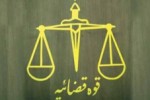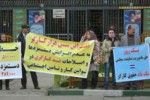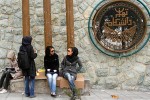مرحله اول شکایت دادخواهان علیه ثابتی پیروز شد
دو رای تاریخی دادگاه در پرونده علیه پرویز ثابتی، مقام سابق ساواک، گامی مهم به سوی عدالت برای جانبهدربردگان شکنجه
اخبار روز: دادگاه فدرال آمریکا در فلوریدا دو رأی تاریخی در پرونده شکایت سه زندانی سیاسی سابق علیه پرویز ثابتی، مقام ارشد پیشین ساواک، صادر کرد که آن را پیروزی مهمی برای جانبهدربردگان شکنجه و گامی تعیینکننده در مسیر عدالت دانستهاند. این آرا ضمن به رسمیت شناختن اسناد و شواهد متعدد درباره نقش مستقیم و آگاهانه ثابتی در هدایت و تسهیل شکنجههای سازمانیافته ساواک، درخواست او برای رد پرونده به بهانه مرور زمان را نپذیرفت و تهدیدها و اقدامات تلافیجویانه علیه شاکیان و وکلایشان را از عوامل مؤثر در تصمیمگیری اعلام کرد. به گفته گروه «همگرایی ایرانیان برای عدالت و پاسخگویی» (ICJA)، این تصمیمها پیام روشنی دارد: مرتکبان نقض فاحش حقوق بشر، فارغ از گذشت زمان و موقعیت سیاسی، نمیتوانند از پاسخگویی بگریزند.
گروه «همگرایی ایرانیان برای عدالت و پاسخگویی» (ICJA) از صدور دو رای مهم دادگاه فدرال آمریکا در ناحیه میانی فلوریدا در پرونده تاریخی علیه پرویز ثابتی، مقام سابق ساواک، استقبال میکند. این دو رای، پیروزی بزرگی برای جانبهدربردگان و گامی تعیینکننده در مسیر عدالت و پاسخگویی محسوب میشود. این آرا همچنین روشن میسازند که الگوی تهدید علیه شاکیان و وکلای آنان از زمان طرح شکایت، در پرونده دادگاه ثبت شده و در تصمیمگیریهای آن موثر بوده است.
در نخستین رای ۱۷ صفحهای که سهشنبه ۲۱ مرداد ۱۴۰۴ – ۱۲ اوت ۲۰۲۵ صادر شد، دادگاه بر اساس «قانون حمایت از قربانیان شکنجه» (TVPA)، درخواست ثابتی و وکلایش برای رد مهمترین ادعای شاکیان را نپذیرفت و اعلام کرد «ادعاهای شاکیان، که منابع قابل اعتماد متعددی برای پشتیبانی از آن ارائه دادهاند ، بهوضوح برای طرح مسئولیت [پرویز ثابتی] از نوع معاونت و همکاری کفایت دارند». به این ترتیب، دادگاه اسناد تاریخی مفصل پشتیبان ادعاهای شاکیان مبنی بر اینکه ثابتی از جمله با «هدایت اقدامات ماموران ساواک در اداره سوم و کمیته مشترک ضد خرابکاری»، «کمک عمده و آگاهانهای» به شکنجهگران ارائه کرده است، به رسمیت شناخت.
دادگاه همچنین تشخیص داد شاکیان «دعوای خود را به نحو کافی اقامه کردهاند» تا نشان دهند ثابتی در توطئهای مشارکت داشته که در برگیرنده توافقی میان او و کسانی که شاکیان نام آنها را به عنوان شکنجهگر ذکر کردهاند برای «بهکارگیری روشهای بازداشت و شکنجههای ادعا شده بهمنظور سرکوب مخالفان رژیم شاه بوده است و این روشها علیه شاکیان هم اعمال شده است.»
دادگاه همچنین اعلام کرد که شاکیان با جزئیات کافی ادعای خود مبنی بر «مسئولیت فرماندهی» ثابتی از طریق اعمال «کنترل موثر» او بر شکنجهگران ادعایی، را مستدل کردهاند. دادگاه به «ادعاهای دقیق درباره نقش گسترده و مقتدرانه خوانده [ثابتی] در ساواک و کمیته» اشاره کرد و استدلالهای ثابتی مبنی بر ناکافی بودن ادعاهای شاکیان درباره «کنترل موثر» وی را «فاقد انسجام منطقی» دانست.
مرور زمان
در این رای تاریخی، دادگاه با درخواست ثابتی برای رد پرونده در این مرحله به دلیل مرور زمان موافقت نکرد. دادگاه اعلام کرد که شکایت شاکیان «حاوی حقایق کافی است که میتواند تعلیق اصل مرور زمان را در این مورد به شکل منصفانه توجیه کند.» در این رابطه، دادگاه به مواردی شامل تائید دختر خوانده [ثابتی] مبنی بر اینکه خانوادهاش نقل مکان کرده، نام خود را تغییر داده و در خفا زندگی کردهاند» و همچنین فقدان هرگونه «راهکار قضایی در ایران یا هر جای دیگر، در کنار تهدیدهای مرگبار از ایران و ایالات متحده» اشاره میکند.
در اقدامی پراهمیت، دادگاه برای بررسی بیشتر اینکه آیا «شرایط فوقالعاده» مانع از طرح زودتر دعوی از سوی شاکیان شده است یا خیر، دستور داده که پرونده وارد مرحله «کشف ادله» در رابطه با این موضوع شود. دادگاه جدول زمانی تعیین کرده است که طرفین باید تا ژانویه ۲۰۲۶ مدارک و استدلالهای خود را به دادگاه ارائه دهند. «کشف ادله» مرحلهای پیش از محاکمه است که در آن طرفین دعوی اسناد و مدارک را از یکدیگر و اشخاص ثالث دریافت میکنند. این فرایند شامل رد و بدل کردن اسناد، اخذ شهادتهای تحت سوگند از سوی طرفین و شاهدان، و تکمیل و ارائه پرسشنامههای کتبی (Interrogatories) است. در این پرونده، کشف ادله میتواند فرصتی برای شاکیان فراهم کند تا شواهد مهمی درباره دههها زندگی مخفیانه ثابتی و تهدیدهایی که به خاطر دادخواهی پیشتر با آن روبهرو بوده یا همچنان هستند، ارائه دهند.
حق استفاده از نام مستعار
در رای دوم و جداگانهای که ۲۲ صفحه است و آن هم سهشنبه ۲۱ مرداد ۱۴۰۴ (۱۲ اوت ۲۰۲۵) صادر شد، دادگاه درخواست ثابتی برای محروم کردن شاکیان از حق ادامه روند با نام مستعار را رد کرد. دادگاه تائید کرد که «از زمان طرح این دعوی، شاکیان مدارک مهمی از تهدیدهای جدی علیه امنیت و سلامت خود، و همچنین تهدیدهای مشابه علیه وکلایشان ارائه کردهاند».
در این رای، تهدیدهای متعدد منتشر شده در شبکههای اجتماعی، از جمله از سوی افرادی که با ثابتی در ارتباط هستند، نقل شده است. همچنین دادگاه یادآور شد که «وکیل شاکیان از سمت فردی که افبیآی اعلام کرده در ایران حضور دارد، تهدید به مرگ شده است».
دادگاه نتیجه گرفت که «شکی نیست که طرح این دعوی، سیلی از تهدیدهای جدی برای خشونت و آسیب علیه شاکیان و وکلای آنها را برانگیخته است» و افزوده که «ارتباط ثابتی با برخی از همان افرادی که این تهدیدها را مطرح کردهاند، بهشدت نگرانکننده است. این عامل همچنان به شدت، و چه بسا بهطور تعیینکننده، به نفع حفظ نام مستعار شاکیان سنگینی میکند».
یک سخنگوی ICJA گفت: «این یک لحظه تاریخی است. دادگاه مشروعیت ادعاهای شاکیان و حق جانبهدربردگان برای دادخواهی، فارغ از تهدید و ارعاب علیه خود و خانوادههایشان را تائید کرده است. شاکیان این پرونده به دنبال منفعت سیاسی یا انتقام نیستند ــ آنها به دنبال حقیقت، پاسخگویی و شأن و کرامتی هستند که از بهرسمیتشناختهشدن رنجشان از سوی یک دادگاه ناشی میشود.»
ICJA شجاعت و پایداری فوقالعاده شاکیانی را که بار رنج خود را دههها در سکوت و با استقامت حمل کردهاند، میستاید. این آرای قضایی نه تنها به جنایات گذشته، بلکه به واقعیت فوری شکنجه و بیعدالتی که امروز در ایران ادامه دارد و به الگوهای مداوم آزار و تهدید علیه دادخواهان اشاره دارد.
پیام دادگاه روشن است: مسئولان نقض فاحش حقوق بشر نمیتوانند از پاسخگویی بگریزند، فارغ از اینکه چند سال گذشته، چه مناصب پرقدرتی داشتهاند یا تا چه حد تلاش کردهاند فرار کنند. دادگاه همچنین روشن ساخته که تهدید و اقدامات تلافیجویانه و تلاش برای ساکتکردن قربانیان، نهتنها مانع عدالت نمیشوند بلکه بخشی از پرونده رسمی شده و بر تصمیمهای دادگاه اثر میگذارد.
درباره پرونده
پرویز ثابتی، مقام ارشد پلیس مخفی پیش از انقلاب ۱۳۵۷ (ساواک)، با یک شکایت ۲۲۵ میلیون دلاری در دادگاه فدرال آمریکا مواجه است که از سوی سه زندانی سیاسی سابق، اکنون ساکن ایالات متحده، مطرح شده است. به عنوان رئیس اداره سوم ساواک، ثابتی متهم است که بر شکنجه نظاممند مخالفان رژیم شاه، از جمله اعمال شوک الکتریکی، ضربوشتم، آویزانکردن از مچ، محرومیت از خواب و گرفتن اعترافات اجباری،ـ نظارت و آن را نهادینه کرده است.
شاکیان مدعیاند که روشهای او میراثی ماندگار بر جای گذاشت که بعدا در جمهوری اسلامی نیز به کار گرفته شد. پس از دههها زندگی در خفا، ثابتی در جریان خیزش «زن، زندگی، آزادی» در سال ۱۴۰۱ دوباره بهطور علنی ظاهر شد و این نخستین فرصت واقعی برای جانبهدربردگان جهت پیگیری عدالت را فراهم کرد.
این پرونده موجی از مواجهه با حقیقت در میان جامعه ایرانی درباره تروما و آسیبهای ماندگار ناشی از شکنجه و ضرورت ایجاد مسیر عدالت و پاسخگویی برای همه جانبهدربردگان را برانگیخته است. این روند در مقطع حساسی شکل گرفته که ایرانیان در حال مواجهه با امکان تغییر سیاسی و تصور آیندهای بر پایه احترام به حقوق بشر هستند،ــ آیندهای که در آن شکنجه و سرکوب دیگر بدون رسیدگی و مجازات باقی نمیماند.
درباره ICJA
«همگرایی ایرانیان برای عدالت و پاسخگویی» (ICJA) ائتلافی از جانبهدربردگان، کنشگران و کارشناسان حقوقی است که متعهد به مستندسازی نقض حقوق بشر، پیگیری پاسخگوکردن ناقضان حقوق بشر و تقویت صدای آسیبدیدگان است. کار ICJA بر این باور استوار است که حقیقتگویی و عدالت برای جلوگیری از جنایات آینده ضروری است.
اخبار روز
Press Release -Two Landmark Court Rulings in Case Against Former SAVAK Official Parviz Sabeti Mark Major Steps Toward Justice for Torture Survivors
For Immediate Release 13 August 2025 The Iranian Collective for Justice & Accountability (ICJA) welcomes two powerful rulings today from the U.S. District Court for the Middle District of Florida in the historic case against former SAVAK official Parviz Sabeti. Together, these decisions represent a tremendous victory for survivors and a decisive step forward in… For Immediate Release
13 August 2025
The Iranian Collective for Justice & Accountability (ICJA) welcomes two powerful rulings today from the U.S. District Court for the Middle District of Florida in the historic case against former SAVAK official Parviz Sabeti. Together, these decisions represent a tremendous victory for survivors and a decisive step forward in the pursuit of justice and accountability. They also make clear that the pattern of threats against the plaintiffs and their counsel since the filing of the complaint is entered into the court’s record and informs its decisions.
In a 17-page ruling, issued on 12 August 2025, the court rejected Sabeti’s Motion to Dismiss the lawsuit’s central claim under the Torture Victim Protection Act (TVPA), finding that the plaintiffs’ “allegations, buttressed by several reliable sources, are clearly sufficient to plead aiding and abetting liability”. The court recognized the detailed historical record supporting the plaintiffs’ allegations that Sabeti provided “knowing substantial assistance” to the plaintiffs’ torturers by “direct[ing] the actions of SAVAK agents, within both the Third Division and the [Joint] Committee [to Fight Terrorism].”
The court further found that the plaintiffs “have adequately alleged” Sabeti’s participation in a conspiracy involving an agreement between Sabeti and the named alleged torturers of plaintiffs and others within the Committee “to use the alleged detainment and torture methods in furtherance of their goal to suppress opposition to the Shah’s regime and that they did so employ them against Plaintiffs.”
The court also concluded that the plaintiffs have sufficiently pleaded Sabeti’s command responsibility involving the exercise of “effective control” over the alleged torturers. The court acknowledged “detailed allegations eliciting Defendant’s broad, authoritative role within SAVAK and the Committee, as Defendant recognizes” and found that Sabeti’s arguments before the court claiming the plaintiffs had not sufficiently alleged his “effective control” over the torturers “do not logically follow.”
Statute of limitations
In its landmark ruling, the court rejected Sabeti’s motion to dismiss the plaintiffs’ claim based on the statute of limitations. The court found that the plaintiffs’ complaint “alleges sufficient facts which may justify an equitable tolling of the statute of limitations”. In this regard, the court referenced “Defendant’s daughter confirming that her family moved, changed their names, and lived in hiding” as well as absence of “available remedies in Iran or elsewhere – compounded by lethal threats emanating from both Iran and the United States.” Crucially, to allow further examination of whether “extraordinary circumstances” prevented the plaintiffs from filing their claim earlier, the court ordered the case to proceed to discovery on this issue. As part of this order, the court set a timeline requiring the parties to complete their submissions on this issue by January 2026.
Discovery is a pre-trial phase where both sides in a lawsuit gather evidence from each other and from third parties. This process typically involves exchanging documents, taking sworn testimony from witnesses and parties through depositions, and submitting written questions called interrogatories. In this case, discovery may provide an opportunity for plaintiffs to present critical evidence regarding Sabeti’s decades in hiding and the threats they previously faced or continue to face in connection with their pursuit of justice.
Propriety of Pseudonymity
In a separate equally significant 22-page ruling, also issued on 12 August 2025, the court denied Sabeti’s motion to strip the plaintiffs of their privacy right to proceed under pseudonyms. The court acknowledged that “[s]ince the filing of this lawsuit, Plaintiffs have produced significant evidence of serious threats to their safety and well-being, in addition to similar threats directed to their legal counsel.” In this regard, the ruling quoted numerous threats posted on social media, including by individuals connected to Sabeti. The court also stated that “Plaintiffs’ counsel has received death threats from an individual that the FBI determined to be in Iran.”
The court concluded that “there can be no question that filing this case has elicited a plethora of serious threats of violence and other harm against both Plaintiffs and their counsel.” The court added that Sabeti’s “connection with some of the very individuals making these threats is deeply concerning. This factor continues to weigh heavily, if not determinatively, in favor of pseudonymity.”
“This is a landmark moment,” said an ICJA spokesperson. “The court has affirmed both the legitimacy of the plaintiffs’ claims and the right of survivors to seek justice free from threats and intimidation against them and their families. The plaintiffs in this case are not seeking political gain or revenge – they are seeking truth, accountability, and the dignity that comes from having their suffering acknowledged by a court of law.”
The ICJA commends the extraordinary courage and perseverance of the plaintiffs, who have carried the weight of their suffering for decades in silence and resilience. These rulings speak not only to the atrocities of the past, but to the urgent reality of torture and injustice that continues in Iran today and to the persistent patterns of harassment and threats against those seeking justice.
The court’s message is unmistakable: those responsible for gross human rights violations cannot hide from accountability – no matter how many years have passed, how powerful their positions, or how far they try to run. The court has also made clear that threats and reprisals against survivors, far from silencing or suppressing the pursuit of justice, can become part of the court’s record and inform its decisions.
About the Case
Parviz Sabeti, a senior official in Iran’s pre-1979 secret police, SAVAK, is facing a landmark $225 million lawsuit in U.S. federal court brought by three former political prisoners now living in the United States. As head of SAVAK’s Third Division, Sabeti is accused of overseeing and institutionalizing torture, including electrocution, beatings, suspension by the wrists, sleep deprivation, and coerced confessions, against dissidents of the Shah’s regime. Plaintiffs allege his tactics left a lasting legacy later adopted by the Islamic Republic. After decades in hiding, Sabeti resurfaced publicly during Iran’s 2022–2023 “Woman Life Freedom” uprising, creating the first real opportunity for survivors to seek justice.
The case against Sabeti has sparked a powerful reckoning amongst Iranians over the enduring trauma of torture and the urgent need to ensure that all survivors have a path to justice and accountability. It comes at a pivotal moment, as Iranians confront the possibility of political change and envision a future grounded in respect for human rights where torture and repression no longer go unaddressed and unpunished.
About ICJA
The Iranian Collective for Justice & Accountability (ICJA) is a coalition of survivors, advocates, and legal experts dedicated to documenting human rights abuses, pursuing accountability for perpetrators, and amplifying the voices of victims. ICJA’s work is rooted in the belief that truth-telling and justice are essential to prevent future atrocities.
Read the Rulings Below



